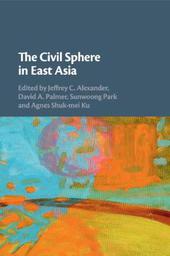
|
The Civil Sphere in East Asia
Paperback / softback
Main Details
| Title |
The Civil Sphere in East Asia
|
| Authors and Contributors |
Edited by Jeffrey C. Alexander
|
|
Edited by David A. Palmer
|
|
Edited by Sunwoong Park
|
|
Edited by Agnes Shuk-mei Ku
|
| Physical Properties |
| Format:Paperback / softback | | Pages:322 | | Dimensions(mm): Height 228,Width 149 |
|
| ISBN/Barcode |
9781108448208
|
| Classifications | Dewey:300.95 |
|---|
| Audience | | Professional & Vocational | | Postgraduate, Research & Scholarly | |
|---|
| Illustrations |
Worked examples or Exercises; 5 Tables, black and white; 1 Halftones, black and white; 1 Line drawings, black and white
|
|
Publishing Details |
| Publisher |
Cambridge University Press
|
| Imprint |
Cambridge University Press
|
| Publication Date |
6 February 2020 |
| Publication Country |
United Kingdom
|
Description
Leading sociologists who live and work in East Asia examine their region's most dangerous and explosive social problems, and some of their most stunning success stories, from the viewpoint of Civil Sphere Theory. This new and increasingly influential sociological understanding of democracy aims to describe and explain the moral codes and institutional foundations of democratic solidarity, as it manifests itself within a distinct social sphere. Part of a multi-volume project, this collection includes cases from Japan, mainland China, Hong Kong, Taiwan, and South Korea, bringing together efforts by sociologists based in East Asian academic institutions. Through an extraordinary blend of sophisticated social theory and path-breaking empirical research, The Civil Sphere in East Asia aims to advance civil sphere theory by globalizing and regionalizing it at the same time.
Author Biography
Jeffrey C. Alexander is the Lillian Chavenson Saden Professor of Sociology at Yale University, Connecticut, where he founded and co-directs the Center for Cultural Sociology. He has authored and edited books in the areas of theory, politics, and culture and chaired the American Sociological Association's Theory and Culture sections. Alexander co-founded and chaired the International Sociological Association's Theory research committee and received The Foundation Mattei Dogan Prize in Sociology from that association in 2009. David A. Palmer is an Associate Professor in the department of Sociology and in the Institute for the Humanities and Social Sciences at The University of Hong Kong. His books include the award-winning Qigong Fever: Body, Science and Utopia in China (2007), Dream Trippers: Global Daoism and the Predicament of Modern Spirituality (2017), and The Religious Question in Modern China (2011), which won the Levenson Book Prize of the Association for Asian Studies. Sunwoong Park is Professor of the Department of Social Studies at Korea National University of Education. He chaired the Korean Association for Cultural Sociology from 2014 through 2017. He has published several articles, including 'The Narrative Representations of the 5.18 Democratic Movements and their Limitations of Cultural Trauma' (with Suryun Kim) in the Korean Journal of Cultural Sociology and 'How Multicultural Youths Become Koreans' (with Hyun Jeong Woo) in Social Theory. Agnes Shuk-mei Ku is Associate Professor of Social Science at the Hong Kong University of Science and Technology, where she previously served as Associate Dean. She is affiliated with the Center for Cultural Sociology at Yale University, Connecticut, and co-chaired a research committee (sociological theory) of the International Sociological Association. Her research interests include cultural sociology, civil society and urban space.
Reviews'At a time when civil spheres are being threatened both by internal forces and external opposition, Jeffrey C. Alexander's seminal work on Civil Sphere Theory gives a powerful sociological account of sources of fragility and resilience. With contributions from a superb team of scholars, this book demonstrates the breadth of Civil Sphere Theory.' Richard Madsden, University of California, San Diego 'Jeffrey C. Alexander, one of America's leading cultural theorists, has been wrestling with the broad intellectual issue of how social space shapes the moral codes of societies. He has set the ambition of looking at societies around the world. For this path-breaking volume, he has collaborated with scholars of East Asia to look at the various moral codes of mainland China, Japan, Korea, Hong Kong, and Taiwan.' Ezra F. Vogel, Harvard University, Massachusetts 'The Civil Sphere in East Asia is an ambitious work that theorizes civil society using the East Asian experiences from a comparative perspective. It will be a must read for those who seek to understand East Asian society and politics.' Gi-Wook Shin, Stanford University, Connecticut 'Combining innovative case studies, comparative leverage, and theoretical strength, this landmark volume provides a new benchmark for comparative studies of political culture. Greater than the sum of its excellent parts, it demonstrates a robust development of civil sphere theory beyond the West and offers a new view of East Asian political cultures.' Lyn Spillman, University of Notre Dame, Indiana
|